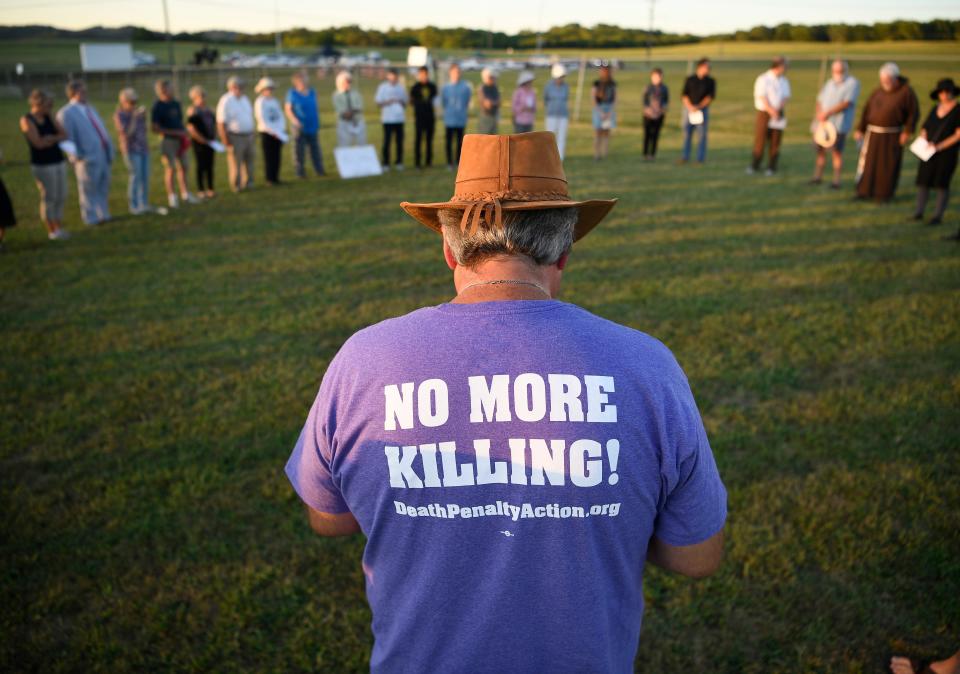How conservatives are making the best case against the death penalty
Amy Lawrence is a conservative.
She has worked for Republican campaigns in Tennessee from the state legislature to Congress. She used to support the death penalty. She now does not.
“I had gone back and forth on it for years,” said Lawrence, who now heads up the Tennessee chapter of Conservatives Concerned About the Death Penalty, “but when I started looking at whether it made practical sense, it just didn’t add up to my conservative values.”
Lawrence may seem to be at the wrong place at the wrong time. Tennessee has executed five people in the last year with another scheduled in December and two more in 2020.
Republican Gov. Bill Lee has shown no interest in intervening either to stop an execution or end the practice of capital punishment.
But conservatives who oppose the death penalty insist that they are on the rise. Republican-sponsored bills to abolish the death penalty came up in 11 states this year, according to Hannah Cox, the national manager for Conservatives Concerned About the Death Penalty.
New Hampshire abolished the death penalty with Republican support, though over the objections of the state’s Republican governor.
There are many reasons to oppose capital punishment
Conservatives who oppose the death penalty do so for a multitude of reasons. Libertarians believe it is not the government’s place to kill people, social conservatives can’t square killing people on one hand and arguing against killing the unborn on the other, while uniting all of these strands is a basic distrust that the government can get it right.
Since 1973, 166 people across the country have been exonerated from death row, according to the Death Penalty Information Center, many of them decades after being sent there.
In addition to the well-documented racial inequities, the death penalty is increasingly geographically concentrated. A 2013 DPIC study found that 2% of the counties in the United States account for a majority of the country’s death sentences since 1976, due to applicable laws, prosecutorial discretion and other factors.
However, entire states are on the hook for the bill once that person moves onto death row, and that ends up more expensive than life without parole.
“It’s a failed big government program that does not use our tax dollars efficiently,” Cox said.
Attorney General Barr: Barr's Mueller report rollout was disgraceful. I can't believe I miss Jeff Sessions.
Tennessee is no exception to the rule. Of the 56 people presently on the state’s death row, 33 were convicted in West Tennessee and 26 are from Shelby County. Nine were convicted in Middle Tennessee and five are from Davidson County. Fourteen were convicted in East Tennessee and seven are from Knox and Hamilton counties.
This, Cox points out, while the violent crime rate in the state remains above the national average, according to the latest statistics.
The argument that the death penalty is a deterrent to crime has always been shaky at best.
Tennessee had no executions during a 40-year period
“I have a list of executions in Cook County beginning in 1840,” the legendary defense lawyer Clarence Darrow said in 1924. “… Ninety poor unfortunate men have given up their lives to stop murder in Chicago. Ninety men have been hanged by the neck until dead, because of the ancient superstition that in some way hanging one man keeps another from committing a crime.”
Darrow is hardly a conservative, for the purposes of this column, but he nevertheless authored perhaps the best argument against the death penalty in American history in the Leopold and Loeb trial.
Tennessee has nearly turned against the death penalty before. Gov. Frank Clement attempted to push for the abolition of executions in 1965, mostly on religious grounds, saying, “Can anyone deny that human judgment is inadequate?”

The effort failed by one vote in the legislature, and Clement subsequently commuted the sentences of the five prisoners on death row. The state didn’t hold a single execution from 1960 until 2000. To my knowledge, no one missed it.
Support for the death penalty was something I was taught as a child, and I didn’t question it. It only seemed fair and right that people who were capable of doing the worst to other human beings pay that price themselves.
I have not been comfortable with that sentence for a number of years, though, and this recent burst of executions has made it impossible for me to avoid.
Reggae during the Trump presidency: Reggae artists and their lyrics help expose Donald Trump's depravity
My faith as I have come to understand it — that Jesus died so we don’t have to — has served as a guide. But as a person who believes deeply in drawing conclusions from the available facts no matter where they lead, I have decided there is nothing fair about the death penalty at all. It is shot through with arbitrary variables that guarantee misfires, mistakes and miscarriages of justice.
Anyone who would maintain a system that kills an innocent person in order to make way for the probability that it will kill the guilty even most of the time should challenge their own priorities.
Support for the death penalty is a feeling. It feels right. But feelings are no way to make government policy.
I was wrong, and so is the state of Tennessee.
Alex Hubbard is assistant opinion editor for The Tennessean, where this column originally appeared. Follow him on Twitter: @alexhubbard7.
You can read diverse opinions from our Board of Contributors and other writers on the Opinion front page, on Twitter @usatodayopinion and in our daily Opinion newsletter. To respond to a column, submit a comment to letters@usatoday.com.
This article originally appeared on Nashville Tennessean: Conservatives who make the case against the death penalty are right

